Table of Contents

Unit 1: Ice-cream Man
Read and Enjoy

What is cold, sweet and creamy, and wonderful to eat? Everyone's favourite treat especially on a hot summer day is an ice cream! And everyone's favourite person might just be the Ice-cream Man! Ice cream Man!
When summer’s in the city,
And brick’s a blaze of heat,
The Ice-cream Man with his little cart
Goes trundling down the street.

Beneath his round umbrella,
Oh, what a joyful sight,
To see him fill the cones with mounds
Of cooling brown and white:

Vanilla, chocolate, strawberry,
Or chilly things to drink
From bottles full of frosty-fizz,
Green, orange, white, or pink.

His cart might be a flower bed,
Of roses and sweet peas,
The way the children cluster round
As thick as honeybees.
RACHEL FIELD

New Words
blaze: bright flame of fire
trundling : moving on small broad wheels
mounds : heap,pile
frosty-fizz : chilled drink making a hissing, bubbling sound
cluster : gather around, group of similar things
Reading is Fun
1. In which season is ice cream popular?
2. Who feels joyful on seeing the Ice-cream Man?
3. Name the different flavours of ice cream the Ice-cream Man has in his cart.
4. What are the two things that the Ice-cream Man is selling?
5. What is the ice-cream cart compared to in the poem?
Let’s Write
Having an ice cream on a hot summer day is exciting and enjoyable.
1. Write about some of the exciting and enjoyable things that
one can do in the winter season.
________________________ ______________________
________________________ ______________________
________________________ ______________________
________________________ ______________________
2. List as many summer activities as you can.
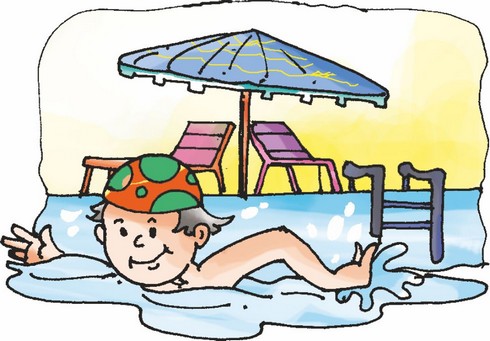
3. Now group these activities into indoor and outdoor
activities.
________________ _____________________
________________ _____________________
Say Aloud
Circle the words where you get a zzzzz sound.
One is done for you.
honeybees
price prize maze face
rice rise blaze fizz
lazy lacy busy racy
raise rays race ace
chase this these frosty
Let's Listen
1. Listen and tell the sounds that these words in the poem produce.
> cart _____
> drinks _____
Can you make these sounds?
2. What are some of the different sounds you hear when the Ice-cream Man comes?
Find Out and Write a Report
Here is a report on Uncle Lal’s farm.
Father took me to visit Uncle Lal’s dairy farm. I saw all of Uncle Lal’s cows. He has fifty cows. They eat grass in the big green farms. In the evening the farmers bring them to the barm to be milked the farmers bring them to the barn to be milked. Uncle Lal sells his milk in the city.
When writing a report, remember to do these things
1. Think of a good title. Write it correctly.
2. Keep to your subject.
3. Tell things in the right order.
4. Make your paper look neat.
In groups of four, write a report on different brands of ice creams available in your area. You may use the following clues.
1. Start with a short introduction which contains the topic.
2. Then list the ice cream brands available in your area.
3. Next, say which are the common flavours of ice cream in each of the brands.
4. Under each brand, find out which flavours are being sold the most. Also find out their prices.
5. Finally, write which do you think is the most popular ice cream.
_____________________________________________________
_____________________________________________________
_____________________________________________________
_____________________________________________________
_____________________________________________________
_____________________________________________________
Word Building
1. Colour the boxes that have rhyming words.
city cart | Heat street | blows goes | Do go |
hard yard | bowl doll
| cow so
| Label table |
Sky my | Play Obey
| Race face | Write night
|
2. What do the following words describe in the poem?
joyful _____
little _____
round _____
What are the describing words used in the poem for the following?
_____ mounds
_____ flavour
_____ cluster
Fun Time
1. Colour the boxes with the colours of the flavours mentioned in each.
Chocolate
Vanilla
Orange
Black
currant
strawberry
raspberry
butterscotch
pista
2. Draw and colour your dream ice cream.
Describe it using interesting describing words — the colours, the flavours, the size, how it looks, tastes, feels etc.
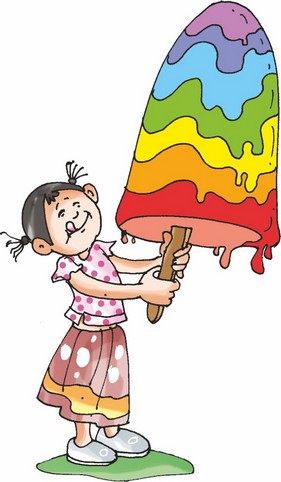
3. Have you ever eaten the ice cream from North India?
The following sentences describe how it is served but they are not in the correct order. Write the correct number before each sentence.
He scoops out the on a plate.
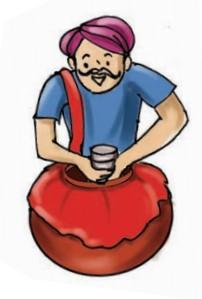
Then he pours some sweet syrup over it and serves it.
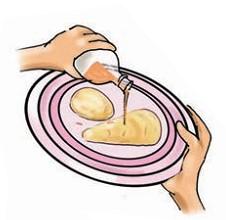
The takes the mould out of the pitcher.
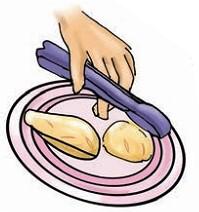
He arranges some around it.
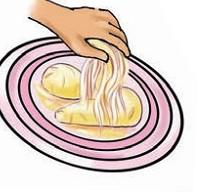
Wonderful Waste!
Waste can be quite useful !
Find out for yourself from this story...
Once, the Maharaja of Travancore ordered a grand dinner in his palace. In the afternoon before the dinner, the Maharaja entered the kitchen to survey the dishes that had been prepared for the feast.
“What are you going to do with those vegetable scraps?” he asked the cook, pointing to the basket of scraps near the cook. The cook replied, “They are waste. We will throw them away.”
“You cannot waste all these bits and pieces of vegetables. Find a way to use them,” the Maharaja commanded sternly and walked away.
The cook was in a fix and kept staring at the vegetable scraps for some time. Suddenly, an idea flashed across his mind.
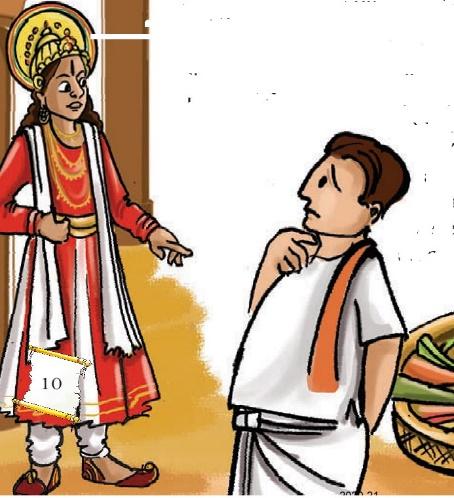
He took all the vegetable bits, washed them and cleaned them well.
Then he cut them into long strips. He put them in a huge pot and placed it on the fire to cook. Next, he ground some fresh coconut, green chillies and garlic together. He added this paste and some salt to the cooking vegetables.
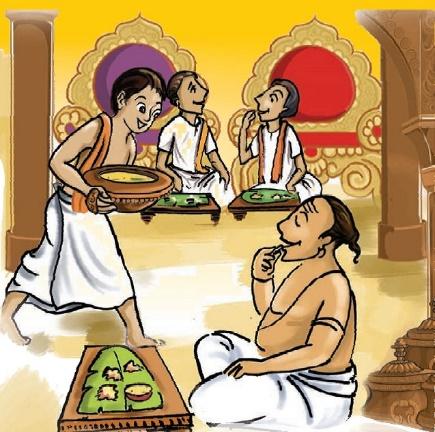
A tempting smell started coming from the pot. Now he whipped some curd and added it to the curry. He also poured a few spoonfuls of coconut oil and decorated the dish with curry leaves.
Lo and behold! The new dish was ready. The cook served this new dish to the guests that evening.
Everyone was eager to know the name of the new dish. The cook thought and thought. Then a name came to his mind. He named it (uh-vi-ul).
Avial became famous all over Kerala and is now one of the dishes in a traditional Kerala feast. And imagine, it all came from a basket of waste!


New Phrases
In a fix : a situation hard to escape from
flash across the mind : suddenly think of
lo and behold : look what a surprise
traditional feast : hearty meal for many guests served on a special occasion
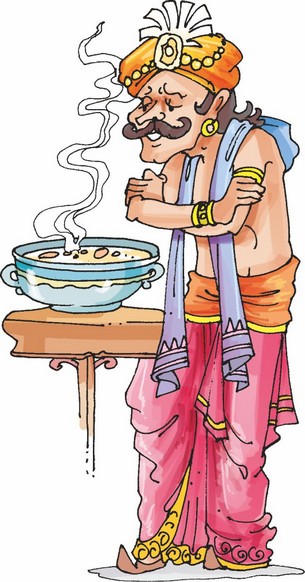
Reading is Fun
1. What were the preparations in the palace for?
2. Why did the Maharaja go into the kitchen in the afternoon?
3. What had the cook planned to do with the vegetable scraps?
4. Ingredients are the things that are used to make a dish. Circle the ingredients of in the box below.
Chillies
Groundnut
Wood
vegetable scraps
coconut
roasted
peanuts
curd pot
garlic
broken bangles
basket
curry leaves
5. State whether the following are True or False.
(i) The king had ordered a dinner in the palace.
_____
(ii) No one had heard of or tasted before.
_____
(iii) The cook had planned to make another dish using the vegetable scraps. _____
1. A recipe is a list of directions to prepare a dish. The following sentences are not in order for preparing avial. Number them in the correct order.
a. Grind some coconut, green chillies and garlic.
b. Cut the vegetable scraps into long strips.
c. Wash and clean the mix of vegetable bits.
d. Decorate with curry leaves.
e. Whip some curd and mix it in.
f. Pour some coconut oil on top.
g Avial is ready.
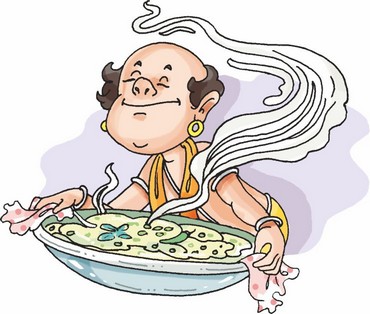
2. Given in the box are some things that children do after they reach home from school.
Choose five things that you do when you reach home from school. Write them in order.
pack school bag
put away school bag
have lunch

read a story book
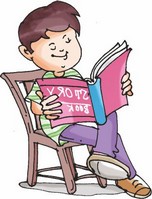
chat with mummy about school
sleep for a while
wash up
do the home work

watch TV

go to play
change out of school uniform
First, I _______________________.
Then, I _______________________.
Next, I _______________________.
After that, I _______________________.
Finally, I_______________________.
Let's Talk
The Maharaja was a wise man and ordered the cook to use the vegetable scraps instead of throwing them away.
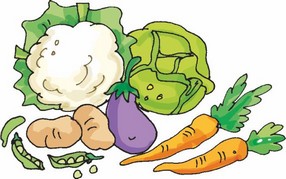
1. Name some of the things which are thrown away at home or in school.
2. Sit in groups of four and think of interesting ways in which they can be made useful.
3. Put up your findings on the class board.
Word Building
Pair work
1. Some words have more than one meaning.
For example, point —
Meanings: noun a dot in print or writing, full stop, decimal, the number you score in a game
verb to show or call attention to something
Look up the following words in the dictionary. They mayhave more than one meaning. List these meanings.
ground _____________________________________
urvey _____________________________________
scrap _____________________________________
sternly _____________________________________
tempting _____________________________________
2. Make new words by adding/dropping a few letters from the root word. Some are done for you.
-ed | -ing | -er | -est | |
pound | x | x | ||
try | tried | x | x | |
large | x | x | ||
new | x | x | ||
tasty | tasted | tasting | tastier | |
wise | x | x | x | x |
stare | ||||
clean |
Do any of these words use all of four endings _____ _____
Find Out
1. Name food that is made in your home
(i) for a feast/ festival.
(ii) when you are unwell.
(iii) everyday.
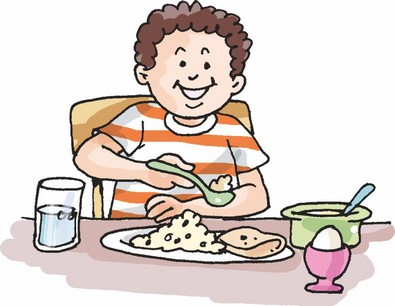
Share the information with your friends.
2. is a dish made in Kerala.
Do you have a similar dish in your state made from a mix of many vegetables?
1. What is it called? _____
2. Note down the ingredients used to make it.

3. Write the recipe.
4. Present attractively and display on the class board. You can draw and stick pictures too.
Have you ever eaten a dish made of bamboo? Let's read this picture story and find out which part of bamboo can be cooked and eaten.
1. One day the mother-in-law of a Santhal bridegroom cooked a special dish for him when he visited her.

2. “This curry is delicious. What is it?” The mother-in-law pointed at the bamboo door.

3. Next morning, just as he was about to leave, he remembered that there was no bamboo in his village.
4. So he removed the bamboo door and carrying it with him left for his home.

5. On reaching his village, he told his wife, “Make curry with this bamboo door.”
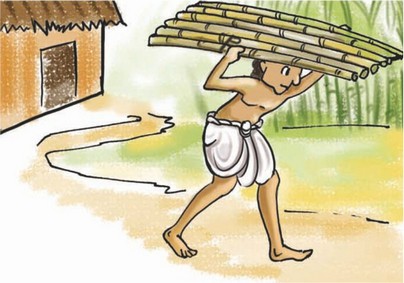
6. She was shocked. “How can I make curry out of a bamboo door?”
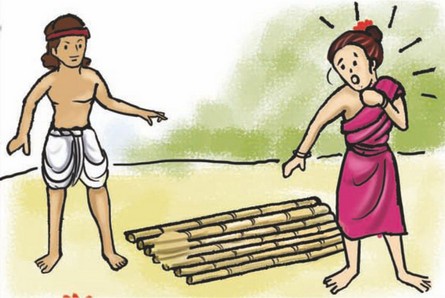
7. “Come, I'll help you by chopping up the bamboo,” he said.

8. His wife boiled it and boiled it. Later when her husband tasted it he said, “It’s too hard to eat. You don’t know how to cook.”
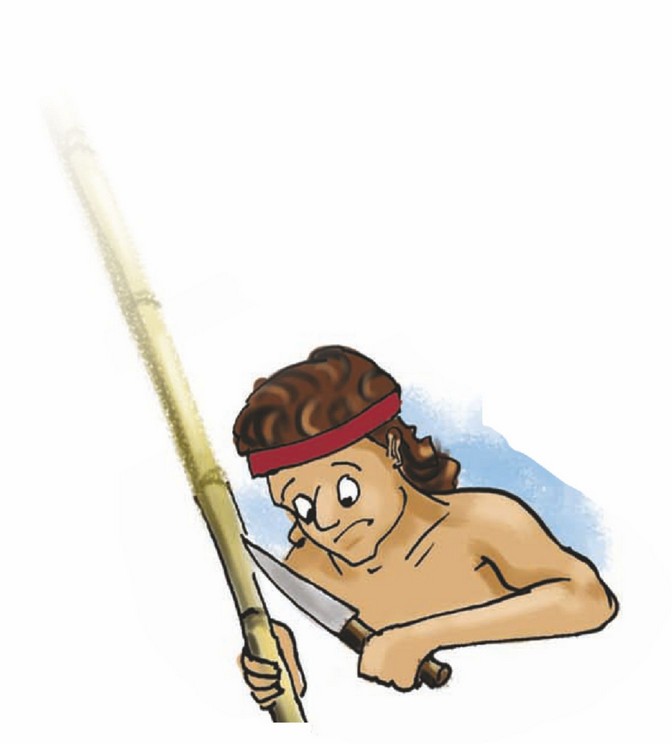
9. His wife added more water and boiled it and boiled it. “It’s still too hard. I can’t eat it.”

10. The in-laws came to visit the young couple that evening. They all laughed at his foolishness. The mother-inlaw said, “ Didn’t you know the curry was made from bamboo shoot and not from a bamboo door?
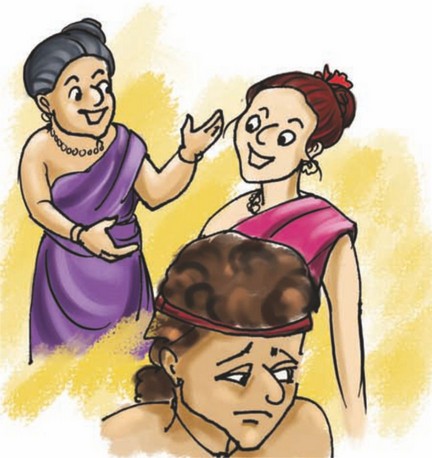
(A Santhal folk tale)
Did you know this?
Let’s Write
1. Complete the sentences meaningfully.
(i) The bridegroom left with the door of his in-laws' house because it was made of _____ and there was no bamboo in his _____.
(ii) The bridegroom was unable to have bamboo curry in the end because _____
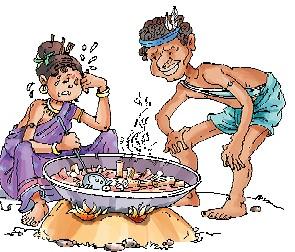
2. Word hunt
Fill in the blanks with words from the story.
(i) The bridegroom went to visit his _____.
(ii) The mother-in-law pointed _____ _____ the bamboo door.
(iii) He stayed the night _____ his in-laws.
(iv) He carried the _____ _____ back with him.
(v) The curry was made _____ bamboo shoots.
Say Aloud
im-pa-tient ( im-pay-shnt)
de-li-cious (di-li-shius)
bo-iled
cho-pped
bam-boo
be-gan
Teacher's Page _______________________________________ UNIT-I
Pome: Ice-cream Man
Story: Wonderful Waste!
Picture story : Bamboo Curry
THEMES
Recycling waste
Folk tales
Multi-cultural approach to food To avoid wastage of food
READING TIME
In every country of the world, there are stories which have been handed down from grandparents to grandchildren or which have been sung by mothers to their babies. These stories are called folk tales and tell us about the customs and culture of the place they are set in.
A Kerala folk tale and a Santhal folk tale have been retold in this unit. The teacher should encourage children to read folk tales from different parts of the country. The mother tongue can be given its due place by being used for discussion and understanding, along with teaching of English.
The and activities should be done through imitation — the teacher first and then the children. Poems could be recited in groups. They may also be presented through dramatisation, actions etc. in the school assembly. The children can make big cutouts of ice creams and vegetables or dress up as particular vegetables or ice-cream and recite the poem. You could think of a suitable rhythm for the poem.
CONVERSATION TIME
The Let’s Talk section can begin with a discussion started by the teacher, in this case on environment and recycling of waste. This can be done with the help of a practical example of children making paper bags from old newspaper. These bags could be given to the neighbourhood provision store to be used instead of plastic bags. Remember, paper bags are environment friendly. Old newspapers can also be used to make envelopes of different sizes and masks for school plays.

WRITING TIME
When we use several sentences to tell others about something that we have seen, read, heard or done, it is called a report. For Report Writing the teacher, along with the children, should first go through the report on Uncle Lal's farm. The children can then do the guided report on ice creams available in their area or on food, toyshops, soaps, some animal, care of pets etc.
PROJECT WORK
A creative activity should be followed by a presentation before the entire class. The poems, recipes, the findings of any task etc. could be done as group activities and presented or displayed in the classroom. This sharing is as important an experience as any individual activity.



